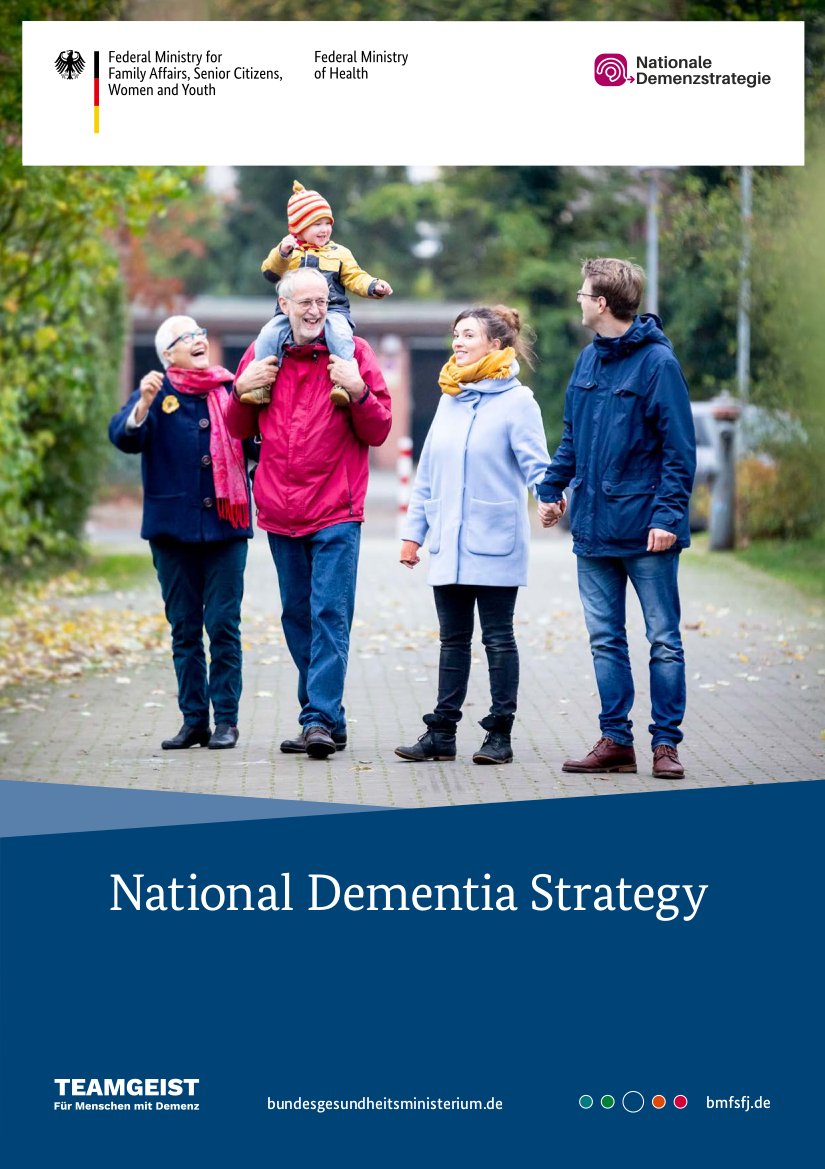The National Dementia Strategy for Germany
Background
Currently there are about 1.6 million people living with dementia in Germany. This number is estimated to increase to 2.8 million by 2050. Thus there is an urgent need for further action to provide better treatment and support for people with dementia and their family caregivers in order to improve their quality of life. In 2012, the World Health Organisation (WHO) and Alzheimer’s Disease International declared dementia as a public health priority. In order to address the impact of dementia the WHO published the ‚Global action plan on the public health response to dementia 2017-2025‘ with recommended courses of action for governments, policy makers and other stakeholders.
The forerunner of the National Dementia Strategy was the ,Alliance for People with Dementia’. It was initiated by the Federal Government in 2012 and implemented its agenda ‘Together for People with Dementia’ between 2014 and 2018. The report on the results of the implementation of the Alliance’s agenda was published in 2018.
Its further development was anchored in the coalition agreement of the current Federal Government. In the National Dementia Strategy this agreement has been implemented.
Developing the Strategy
Following the announcement by Federal Minister for Family Affairs Franziska Giffey and Federal Minister of Health Jens Spahn in September 2018 the development of a National Dementia Strategy was officially launched with a kick-off event in January 2019. Four working groups regularly met to set up the measures on the strategy’s four fields of action:
- Developing and establishing dementia-inclusive communities to enable people with dementia to participate in society
- Supporting people with dementia and their relatives
- Advancing health and long-term care services for people with dementia
- Promoting excellent research on dementia.
The involved stakeholders defined 27 objectives and agreed upon 162 measures. The strategy intends to strengthen the cooperation between stakeholders from different health and social care sectors. Cross-cutting themes were considered as well, such as on digitisation and the use of technology for people with dementia or on the situation of people with dementia and their family carers with a migratory background.
The National Dementia Strategy was officially adopted by the German Federal Government on 1 July 2020. On 23 September 2020, the official commencement of the implementation was accompanied by a live event with Federal Minister for Family Affairs Franziska Giffey, Federal Minister of Health Jens Spahn and Federal Minister of Research Anja Karliczek.
Involving the stakeholders
Dementia affects different areas of life and has multiple effects on the living conditions of people with dementia. The complexity of the issue is resembled in the variety of stakeholders involved in the development and the implementation of the strategy.
The Federal Ministry for Family Affairs, Senior Citizens, Women and Youth and the Federal Ministry of Health, as leading ministries, have invited representatives of the federal states, municipalities, social security institutions, the scientific and research community, the leading welfare organisations, professional and trade associations, civil society, associations of health care and long-term care professionals as well as health and long-term care insurance providers to contribute to the strategy. The German Alzheimer Society – Dementia Self-Help co-chaired the process. The Federal Ministry of Education and Research took over a significant role with regard to the development of measures within the field of dementia research.
The development and implementation of the strategy is overseen by a steering group which consists of the strategy’s central stakeholders. The steering group is chaired by the directing ministries.
In order to strengthen the cooperation between the participating stakeholders a National Dementia Strategy Network was established. A network meeting will be conducted annually offering opportunities for stakeholders to exchange experiences, reflect on present obstacles and develop solutions.
Implementation and monitoring
The strategy is set as a long-term process providing the possibility to consider changing priorities and challenges, such as the COVID-19 pandemic, and their impact on the lives of people with dementia and their (family) caregivers. Therefore, decisions for further needs for action or adaptions can be made throughout the process. However, the outcome of the strategy and the necessity for further development will be reviewed after 2026.
The implementation is accompanied by a monitoring system. All measures are to be implemented within a certain timeframe. Shortly after the scheduled date of completion, stakeholders are asked to evaluate the implementation status of their measures. The results of the query are published in a report passed by the steering group.
